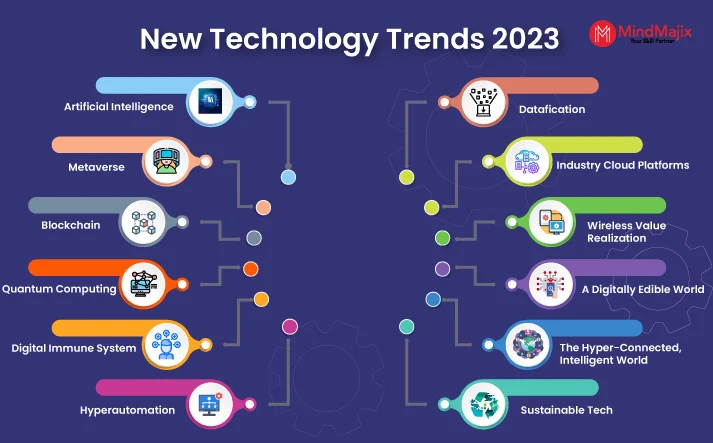As we step into 2024, the conversation around blockchain technology is evolving beyond its initial association with cryptocurrency. “Blockchain Beyond Crypto: Real-world Applications In 2024” delves into the myriad ways this revolutionary technology is being harnessed across various sectors. From supply chain management to healthcare, blockchain is proving to be a game-changer, offering enhanced transparency, security, and efficiency. This article will explore the diverse applications of blockchain that are set to redefine industries and improve everyday life.
In the following sections, readers will uncover how blockchain is transforming traditional business models, enabling secure transactions, and fostering trust among stakeholders. We will examine case studies that highlight successful implementations of blockchain in sectors such as finance, logistics, and even voting systems. By understanding these real-world applications, you will gain insights into how blockchain can solve pressing challenges and create new opportunities for innovation.
Moreover, we will discuss the future implications of blockchain technology, including potential regulatory changes and the role of decentralized finance (DeFi) in shaping economic landscapes. Whether you are a tech enthusiast, a business leader, or simply curious about the future of technology, this article promises to provide valuable knowledge and inspire you to think critically about the impact of blockchain beyond cryptocurrency. Join us as we explore the exciting possibilities that lie ahead!
As we move into 2024, the potential of blockchain technology extends far beyond cryptocurrencies. This article explores various real-world applications of blockchain that are set to transform industries and enhance operational efficiencies.
Supply Chain Management
Blockchain technology is revolutionizing supply chain management by providing transparency and traceability. With the ability to record every transaction on a decentralized ledger, companies can track the movement of goods from origin to destination. This not only helps in verifying the authenticity of products but also reduces fraud and errors.
In 2024, we can expect more companies to adopt blockchain solutions to enhance their supply chain operations. For instance, major retailers are already using blockchain to monitor the sourcing of their products, ensuring ethical practices and compliance with regulations. The integration of IoT devices with blockchain can further streamline processes, allowing real-time tracking and data sharing among stakeholders.
Healthcare Data Management
In the healthcare sector, blockchain offers a secure and efficient way to manage patient data. By utilizing a decentralized system, healthcare providers can ensure that patient records are immutable and accessible only to authorized personnel. This enhances patient privacy and reduces the risk of data breaches.
As we look to 2024, the implementation of blockchain in healthcare is expected to grow. Hospitals and clinics are likely to adopt blockchain for managing electronic health records (EHRs), enabling seamless sharing of information across different platforms while maintaining data integrity. This could lead to improved patient outcomes and streamlined administrative processes.
Digital Identity Verification
Digital identity verification is becoming increasingly important in our online world. Blockchain technology can provide a secure and tamper-proof method for individuals to verify their identities without relying on centralized authorities. This can significantly reduce identity theft and fraud.
In 2024, we anticipate a rise in the use of blockchain for digital identity solutions. Companies are exploring decentralized identity systems that allow users to control their personal information and share it selectively. This shift not only enhances security but also empowers individuals with greater control over their digital identities.
Smart Contracts in Real Estate
Smart contracts, powered by blockchain, are set to transform the real estate industry by automating transactions and reducing the need for intermediaries. These self-executing contracts can facilitate property sales, leases, and transfers with predefined conditions, ensuring transparency and efficiency.
As we approach 2024, the adoption of smart contracts in real estate is expected to increase. This technology can streamline processes such as title transfers and escrow services, significantly reducing transaction times and costs. Additionally, it can enhance trust among parties involved in real estate transactions.
Voting Systems
Blockchain technology has the potential to revolutionize voting systems by providing a secure and transparent method for casting and counting votes. By utilizing a decentralized ledger, the integrity of the voting process can be ensured, reducing the risk of tampering and fraud.
In 2024, we may see more governments and organizations experimenting with blockchain-based voting systems. This could lead to increased voter participation and trust in the electoral process. The ability to verify votes in real-time can also enhance accountability and transparency in democratic systems.
Energy Trading Platforms
Blockchain is paving the way for decentralized energy trading platforms, allowing consumers to buy and sell excess energy directly with one another. This peer-to-peer energy trading model can enhance energy efficiency and promote the use of renewable energy sources.
As we move into 2024, the implementation of blockchain in energy markets is expected to grow. By enabling real-time transactions and transparent pricing, blockchain can empower consumers to take control of their energy consumption and contribute to a more sustainable energy ecosystem.
Intellectual Property Protection
Intellectual property (IP) protection is a critical concern for creators and innovators. Blockchain technology can provide a secure way to register and track IP rights, ensuring that creators receive proper recognition and compensation for their work.
In 2024, we can expect more industries to adopt blockchain for IP management. By creating a transparent and immutable record of ownership, blockchain can help prevent piracy and unauthorized use of creative works. This can foster innovation and encourage creators to share their work without fear of infringement.
Financial Services and Banking
Blockchain technology is transforming the financial services industry by enabling
| Application Area | Description | Benefits |
|---|---|---|
| Supply Chain Management | Blockchain technology is used to enhance transparency and traceability in supply chains, allowing all parties to track the movement of goods in real-time. | Improved efficiency, reduced fraud, and enhanced trust among stakeholders. |
| Healthcare | Blockchain can securely store patient records and facilitate the sharing of medical data among authorized professionals while maintaining patient privacy. | Enhanced data security, improved patient care, and streamlined processes. |
| Voting Systems | Blockchain can be utilized to create secure and transparent voting systems, ensuring that votes are accurately counted and tamper-proof. | Increased voter trust, reduced fraud, and improved election integrity. |
| Real Estate | Blockchain can simplify property transactions by providing a secure and transparent ledger for ownership records, reducing the need for intermediaries. | Faster transactions, reduced costs, and increased transparency. |
| Intellectual Property | Blockchain can help artists and creators protect their intellectual property rights by providing a verifiable record of ownership and usage. | Enhanced protection for creators, reduced piracy, and easier licensing. |
| Financial Services | Beyond cryptocurrencies, blockchain can streamline cross-border payments, reduce transaction costs, and enhance security in financial transactions. | Faster transactions, lower fees, and increased security. |
| Energy Sector | Blockchain can facilitate peer-to-peer energy trading, allowing consumers to buy and sell excess energy directly with one another. | Increased efficiency, reduced energy costs, and enhanced sustainability. |




